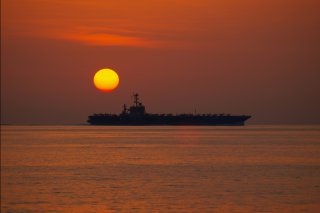This U.S. Navy Aircraft Carrier Might Have Its Name Changed
The seventh Nimitz-class nuclear-powered supercarrier was commissioned in December 1996. She completed her inaugural overseas deployment in the summer of 1998 when the crew of more than 5,200 sailors participated in six naval exercises and more than 700 shipboard drills.
The Nimitz-class carrier USS John C. Stennis (CVN-74) is scheduled to begin its refueling and complex overhaul (RCOH), which essentially marks the "halfway" point in a nuclear aircraft carrier's lifecycle. In addition, the RCOH will address about thirty-five percent of all maintenance and modernization required during the carrier's fifty-year service life. Work will reportedly include refueling the ship's nuclear reactors, while work will be conducted on more than 2,300 components as well as the hundreds of tanks and systems.
What is uncertain is whether the 1,092-foot long carrier will reenter service in 2025 with a new name?
USS John C. Stennis, A History
Nicknamed "Johnny Reb," CVN-74 was commissioned in December 1995 and named in honor of Democratic Senator John C. Stennis of Mississippi, who hadn't lost an election in 60 years.
The name of the carrier, which was approved by then-President Ronald Reagan in 1988, was an interesting choice as Stennis wasn't a navy man. All of the other carriers in the Nimitz-class are named for either those with ties to the service – including Adm. Chester W. Nimitz and Carl Vinson, a Congressman who was known as the Father of the Two-Ocean Navy – or former U.S. presidents.
Stennis is neither, and the naming of the carrier has been the subject of controversy as he was an outspoken critic of civil rights and racial equality. The nickname has also drawn its share of criticism in recent years.
Operational Record
The seventh Nimitz-class nuclear-powered supercarrier was commissioned in December 1996. She completed her inaugural overseas deployment in the summer of 1998 when the crew of more than 5,200 sailors participated in six naval exercises and more than 700 shipboard drills.
In May 2001, while part of Carrier Group 7 the ship served as what was described as the largest and most expensive outdoor theater when it was used for the world premiere of the film Pearl Harbor. During the special screening, more than 2,000 people attended the premiere on the ship, which required special grandstand seating as well as one of the world's largest movie screens assembled on the flight deck.
Following the September 11, 2001, terrorist attacks on New York City, "Johnny Reb" was deployed to the U.S. Fifth Fleet in support of Operation Enduring Freedom.
In January 2012, just days after Tehran had warned the U.S. Navy not to have the carrier return to the Persian Gulf – which was dismissed – the crew of the John C. Stennis led the rescue of an Iranian flagged fishing vessel that had been seized by pirates. More recently, the carrier launched combat sorties in support of Operation Freedom's Sentinel in Afghanistan.
The carrier's embarked air wing consists of eight to nine squadrons of fixed-wing and rotary aircraft including Navy and Marine Corps F/A-18 Hornets, EA-18G Growlers, MH-60Rs, MH-60Ss and E-2C Hawkeyes. As with other carriers in her class, CVN-74 has four catapults and four arresting gear engines that enable her to launch and recover aircraft rapidly and simultaneously. Following her RCOH, CVN-74's air wing will almost certainly include the F-35C, the U.S. Navy's carrier variant of the Joint Strike Fighter.
Peter Suciu is a Michigan-based writer who has contributed to more than four dozen magazines, newspapers and websites. He regularly writes about military small arms, and is the author of several books on military headgear including A Gallery of Military Headdress, which is available on Amazon.com.

